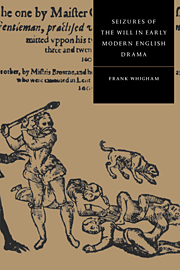Book contents
- Frontmatter
- Contents
- Acknowledgments
- Abbreviations
- Introduction
- 1 Forcing divorce in The Spanish Tragedy
- 2 Hunger and pain in Arden of Faversham
- 3 The ideology of prodigality in The Miseries of Enforced Marriage and A Yorkshire Tragedy
- 4 Sexual and social mobility in The Duchess of Malfi
- Afterword
- Notes
- Works cited
- Index
Introduction
Published online by Cambridge University Press: 17 August 2009
- Frontmatter
- Contents
- Acknowledgments
- Abbreviations
- Introduction
- 1 Forcing divorce in The Spanish Tragedy
- 2 Hunger and pain in Arden of Faversham
- 3 The ideology of prodigality in The Miseries of Enforced Marriage and A Yorkshire Tragedy
- 4 Sexual and social mobility in The Duchess of Malfi
- Afterword
- Notes
- Works cited
- Index
Summary
They that are glorious must needs be factious. … Honour that is gained and broken upon another hath the quickest reflection; like diamond cut with facets.
Bacon EssaysWhether we fall by ambition, blood, or lust,
Like diamonds, we are cut with our own dust.
Webster The White DevilThe act of resentment is the touchstone of honour.
Pitt-Rivers “Honour and Social Status”In this study I investigate the recurrent fascination of early modern English drama with certain moments of self-construction or identification which I shall call “seizures of the will.” I deploy this phrase as a programmatic pun, with multiple elements. I mean to point both to appropriation, the act of grasping, of taking, of violating, of seizing control, and to ecstasy, the thrill or spasm or fit of emotion, of transcendent feeling, that often accompanies the gesture in the plays of early modern England. There is also a subject–object binary: one seizes something else, an external thing, another being, the self as made. I enter upon a construction of these elements because, I believe, historicist analysis must engage the conscious and concrete utility of the category of the will for early modern England. This venture is pursued in concert with a more general reappropriation of the category in contemporary social theory generally.
Much of great value has been done in literary studies in recent years to foreground external determinations of individual life in early modern England, but the men and women who lived out their complex lives then used the notion of personal will quite energetically to construe those lives.
- Type
- Chapter
- Information
- Seizures of the Will in Early Modern English Drama , pp. 1 - 21Publisher: Cambridge University PressPrint publication year: 1996



